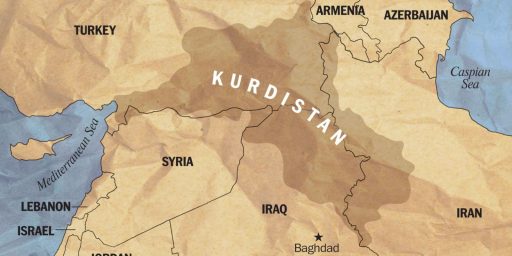Iraqi Police Training Botched?
Lee Hamilton and Ed Meese have told the Senate Judiciary Committee that the training of Iraq’s police and judges has been mishandled.
The U.S. erred by first assigning the task of shaping the judicial system in a largely lawless country to the State Department and private contractors who “did not have the expertise or the manpower to get the job done,” Hamilton and Meese said in testimony obtained by The Associated Press. In 2004, the mission was assigned to the Defense Department, which devoted more money to the task. But department officials also were insufficiently trained for the job, Hamilton and Meese said.
As a result, Iraq has little if any on-the-street law enforcement personnel or a functioning judicial system free of corruption, they said. Justice Department officials, they said, should lead the work of transforming the system. Police executives and supervisors should replace the military police personnel now assigned. And the FBI should expand its investigative and forensic training in Iraq, Hamilton and Meese told the panel.
The recommendations about the Iraqi judicial system were included in the Iraq Study Group’s report last year, but got little attention. Hamilton and Meese said Wednesday that unless the U.S. helps create a capable, trained professional police force and functioning criminal justice system, “ordinary Iraqis will not live in peace and will not have confidence in their new government.”
It’s unclear to me why military police, who are at least as well trained as their civilian counterparts, would not be up to the task of teaching police tactics. Further, as a logistical matter, there are almost certainly not enough FBI trainers available to go around and it’s unlikely enough civilian police would have any desire to deploy to Baghdad for this mission to matter.
I would argue, too, that the situation faced by Iraqi security forces far more closely resembles a military policing task than ordinary peacetime law enforcement. Indeed, I can’t imagine LAPD or NYPD would be all that effective in Baghdad under present circumstances.






Who actually comprise our military police? My understanding is that quite a number of them are police officers in civilian life.
Lets not forget who the first contractor hired to “train” Iraqi police: Giuliani Parnters. Led by Rudy’s hack, Bernie Kerik, Bush claimed:
“Because of his leadership, his knowledge and his experience, he was able to stand up a police force in Baghdad in a very quick period of time. I think he told me opened up 37 different precinct stations — 35 different precinct stations. They activated and trained 35,000 Iraqi police force. And that’s important because the ultimate solution to the security issues in Iraq is for the Iraqi citizens to manage their own affairs.”
What the hell happened to those 35,000 officers?
Who actually comprise our military police? My understanding is that quite a number of them are police officers in civilian life.
The MPs are disproportionately in the Army Reserve and, yes, a significant number of them are cops and prison guards in civilian life.
My brother is a colonel embedded in an Iraqi unit in Baghdad. He was home last week and we talked quite a bit. My impression was that his overall opinion of the Iraqi police was very unfavorable, whereas he seemed to regard the Iraqi army with at least some amount of respect.
That’s my meager contribution to this discussion.
Just in case what I was suggesting was too oblique, if the military police are (within the margin of error) civilian police with some additional training as military police, who the heck do they expect to train the Iraqi police?
I don’t think there’s an immediate and direct correlation between being able to do the job of ‘police officer’ and training others to be police officers. You don’t have just any-ole-street-cop doing that job in police academies. Nor do you have your average GI doing basic training.
True trainers are in very limited supply.
Our military culture, as exemplified in the role of non-commissioned officers, is to know their job (regardless of MOS) well enough to get promoted and train others to do it. Any who might disagree have likely not been there or done that.
We’re not talking about brain surgery here. Our MPs are very well prepared to share the knowledge. Any lack of training sits squarely on the Iraqis’ willingness to learn.
The part that makes sense to me is the criticism that the Justice Department should have been more involved in helping build the institutions for a law enforcement and justice system–things that the military, MPs or no, are not well versed at doing.
It all gets back to issues of “nation building” as well as to adequate planning for the post-invasion period (or the lack thereof).